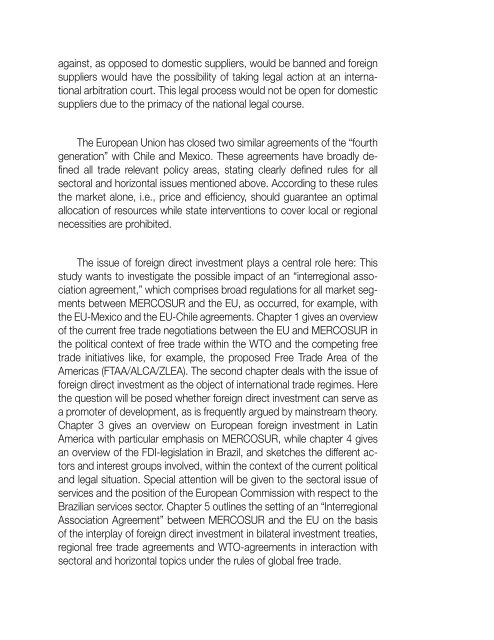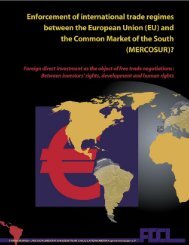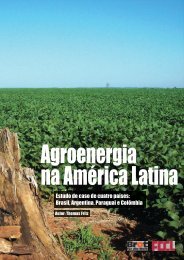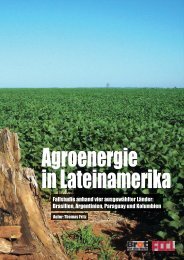(EU) and the Common Market of the South (MERCOSUR)? - FDCL
(EU) and the Common Market of the South (MERCOSUR)? - FDCL
(EU) and the Common Market of the South (MERCOSUR)? - FDCL
Create successful ePaper yourself
Turn your PDF publications into a flip-book with our unique Google optimized e-Paper software.
against, as opposed to domestic suppliers, would be banned <strong>and</strong> foreign<br />
suppliers would have <strong>the</strong> possibility <strong>of</strong> taking legal action at an international<br />
arbitration court. This legal process would not be open for domestic<br />
suppliers due to <strong>the</strong> primacy <strong>of</strong> <strong>the</strong> national legal course.<br />
The European Union has closed two similar agreements <strong>of</strong> <strong>the</strong> “fourth<br />
generation” with Chile <strong>and</strong> Mexico. These agreements have broadly defined<br />
all trade relevant policy areas, stating clearly defined rules for all<br />
sectoral <strong>and</strong> horizontal issues mentioned above. According to <strong>the</strong>se rules<br />
<strong>the</strong> market alone, i.e., price <strong>and</strong> efficiency, should guarantee an optimal<br />
allocation <strong>of</strong> resources while state interventions to cover local or regional<br />
necessities are prohibited.<br />
The issue <strong>of</strong> foreign direct investment plays a central role here: This<br />
study wants to investigate <strong>the</strong> possible impact <strong>of</strong> an “interregional association<br />
agreement,” which comprises broad regulations for all market segments<br />
between <strong>MERCOSUR</strong> <strong>and</strong> <strong>the</strong> <strong>EU</strong>, as occurred, for example, with<br />
<strong>the</strong> <strong>EU</strong>-Mexico <strong>and</strong> <strong>the</strong> <strong>EU</strong>-Chile agreements. Chapter 1 gives an overview<br />
<strong>of</strong> <strong>the</strong> current free trade negotiations between <strong>the</strong> <strong>EU</strong> <strong>and</strong> <strong>MERCOSUR</strong> in<br />
<strong>the</strong> political context <strong>of</strong> free trade within <strong>the</strong> WTO <strong>and</strong> <strong>the</strong> competing free<br />
trade initiatives like, for example, <strong>the</strong> proposed Free Trade Area <strong>of</strong> <strong>the</strong><br />
Americas (FTAA/ALCA/ZLEA). The second chapter deals with <strong>the</strong> issue <strong>of</strong><br />
foreign direct investment as <strong>the</strong> object <strong>of</strong> international trade regimes. Here<br />
<strong>the</strong> question will be posed whe<strong>the</strong>r foreign direct investment can serve as<br />
a promoter <strong>of</strong> development, as is frequently argued by mainstream <strong>the</strong>ory.<br />
Chapter 3 gives an overview on European foreign investment in Latin<br />
America with particular emphasis on <strong>MERCOSUR</strong>, while chapter 4 gives<br />
an overview <strong>of</strong> <strong>the</strong> FDI-legislation in Brazil, <strong>and</strong> sketches <strong>the</strong> different actors<br />
<strong>and</strong> interest groups involved, within <strong>the</strong> context <strong>of</strong> <strong>the</strong> current political<br />
<strong>and</strong> legal situation. Special attention will be given to <strong>the</strong> sectoral issue <strong>of</strong><br />
services <strong>and</strong> <strong>the</strong> position <strong>of</strong> <strong>the</strong> European Commission with respect to <strong>the</strong><br />
Brazilian services sector. Chapter 5 outlines <strong>the</strong> setting <strong>of</strong> an “Interregional<br />
Association Agreement” between <strong>MERCOSUR</strong> <strong>and</strong> <strong>the</strong> <strong>EU</strong> on <strong>the</strong> basis<br />
<strong>of</strong> <strong>the</strong> interplay <strong>of</strong> foreign direct investment in bilateral investment treaties,<br />
regional free trade agreements <strong>and</strong> WTO-agreements in interaction with<br />
sectoral <strong>and</strong> horizontal topics under <strong>the</strong> rules <strong>of</strong> global free trade.









